九年级 Units 3、4
Units 3 4单元讲义人教版九年级英语全册

九年级人教版英语各单元重点短语及句型3-4单元Unit 3 could you please tell me where the restrooms are?一.重点短语turn left/right 向左转/向右转on one’s left/right 在某人的左/右边go along Main Street 沿着主大街走have dinner 吃晚饭tell sb. to do sth. 叫某人做某事tell sb. not to do sth. 叫某人不做某事go to the third floor 去三楼a room for resting 休息室be special about.. . 有……独特之处pardon me 请再说一次come on 过来、加油one one’s way to... 在去....的路上something to eat 一些吃的东西hold one’s hand 抓住某人的手mail(send) a letter 寄信pass by 路过be busy doing sth. 忙于做某事a rock band 一个摇滚乐队in the shopping center 在购物中心in some situations 在某些场合park one’s car 停车an underground parking lot 一个地下停车库such as 例如thank sb. for doing sth. 为…感谢某人look forward to…期盼…meet sb. for the first time 第一次见到某人in a rush to do sth. 仓促地做某事be convenient to do sth. 做某事很方便a pair of 一对、一双、一副look forward to doing sth. 盼望、期待做某事excuse me 打扰了、请原谅get some information about... 获取有关…的一些信息go past 经过、路过a little earlier 早一点儿a good place to eat 一个吃饭的好地方depend on 取决于、依赖于in different situation 在不同的情况下on time 准时、按时get to 到达Communicate with sb. 与某人交流on one’s / the right 在某人的右边、在右边the shopping center 购物中心the corner of... ...的角落/拐角处lead into 导入、引入spend time doing sth. 花时间做某事二、句型和知识点1、问路的一些基本句型。
Units3~4复习课件九年级英语上册(1)

Ⅰ
Ⅱ
Ⅲ
Ⅳ
Ⅴ
Ⅵ
Ⅶ
Ⅷ
( A )49. Among them, who has short and white hair?
A. ①②
B. ②④
C. ①④
D. ②③
( C )50. What does the underlined word “honorary” mean in
Chinese?
A. 杰出的
Ⅰ
Ⅱ
Ⅲ
Ⅳ
Ⅴ
Ⅵ
Ⅶ
Ⅷ
( A )36. A. its
B. your C. our
( C )37. A. stars
B. planes C. lanterns
( B )38. A. with
B. for
C. about
( A )39. A. has been B. was
C. is
( C )40. A. simple B. valuable C. common
little hair
short black hair
Ⅰ
Ⅱ
Ⅲ
Ⅳ
Ⅴ
Ⅵ
Ⅶ
Ⅷ
( A )46. Who got 2020 the Medal of the Republic?
A. Zhong Nanshan.
B. Zhang Boli.
C. Zhang Dingyu.
D. Chen Wei.
( B )47. Where does Zhang Boli come from?
an important competition?
— Yes, it also raised a hot
about the use of AI.
Units3-4高频熟词生义人教版英语九年级全册

Hale Waihona Puke 12silentadj. 沉默的
adj. 无声的;寂静的;不提供情况的
silent films 无声电影 remain silent sbout/ on the matter of ... 对...问题避而不谈
13
score
n. 得分;分数;二十
v. 赢得;取得;得分;打分
score a great success取得巨大成功score over sb. 胜过某人
14
deal
n. 交易;协议;大事
v. 交易 (dealt/ dealt)
It's (not) a big deal.(不)是大事It's a deal. 就这么定了。deal with 处理;接待;惩处
15
fail
v. 失败;不及格
v. 出故障;衰退;破产;使失望
hearing/ eyesight failed听力/视力衰退let down = fail 使失望
9年级高频熟词生义(Unit 3 - Unit 4)
Unit3
熟词生义
序号
单词
课本意思
熟词生义
备注 (考点 & 难点)
1
stamp
n. 邮票;印章
v. 盖章;跺脚;表明
stamp sb. as ...表明某人是...
2
beside
prep. 在旁边;在附近
prep. 和...相比
My painting looks childish beside yours. 我的画和你的比起来非常幼稚。
16
crowd
n. 人群;观众;一群
v. 挤
Units3-4教案.2023-2024学年人教版英语九年级全册

板书设计
①艺术性:
- 使用不同颜色的粉笔进行板书设计,如用蓝色粉笔书写过去进行时的构成,用红色粉笔标注重点难点。
- 利用图表、图片等元素,将过去进行时的用法以直观的方式呈现,例如用一个正在进行的动作的插图来表示过去进行时。
教学资源拓展
1.拓展资源:
(1)英语绘本:选择一些与过去进行时相关的英语绘本,如《The Cat in the Hat》等,让学生在阅读过程中感受过去进行时的运用,提高他们的语言素养。
(2)英语电影:推荐一些经典的电影片段,如《Back to the Future》、《The Godfather》等,让学生观看并分析其中过去进行时的运用,增强他们的语感。
3.成果分享:每个小组将选择一名代表来分享他们的讨论成果。这些成果将被记录在黑板上或投影仪上,以便全班都能看到。
五、总结回顾(用时5分钟)
今天的学习,我们了解了过去进行时的基本概念、重要性和应用。同时,我们也通过实践活动和小组讨论加深了对过去进行时的理解。我希望大家能够掌握这些知识点,并在日常生活中灵活运用。最后,如果有任何疑问或不明白的地方,请随时向我提问。
第一课时
步骤
师生互动设计
二次备课
教学方法与手段
教学方法:
1. 任务驱动法:通过设计具有挑战性和实际意义的任务,激发学生的学习兴趣和主动性,培养他们的语言能力和合作精神。例如,让学生分组讨论和编写关于过去进行时的故事,并在课堂上进行分享。
2. 情境教学法:通过创设真实、生动的情境,帮助学生理解和运用过去进行时。例如,利用图片、视频等材料,展示过去某个时刻正在进行的动作,引导学生用英语进行描述。
九3-4

1.Sixteenyearolds should be allowed to get their ears pierced. (Unit 3) get their ears pierced使用了get sth. done结构,意为“使……被做;让(某人) 做某事”,done为过去分词作宾语补足 语,和宾语之间构成被动关系,相当于 have sth. done。 You'd better get/have your pencil cut.
their parents. 2.I was too tired to do well in the exam yesterday.( 改为同
be allowed
义句)
I was ___ so tired ____________ do well in the exam yesterday. 3.She is creative_and_outgoing.(就画线部分提问) Байду номын сангаас________ she ______?
5.A friend offers you cigarettes at a party. 一个朋友在聚会上给你香烟。(Unit 4) offer v.提供 常见短语:①offer sb. sth.=offer sth. to sb. 为某人提供某物 ②offer to do sth.主动提出做某事
plenty
importance
二、根据汉语提示完成句子(16分) 1.我怎么也想不出那人的名字来了。
I couldn't _________ the name of that man anyhow.
2.如果那男孩的父母死了该怎么办呢?
think of
What if boy's parents should die? ________ the
Units 3-4单元单词、短语及重点句型归纳拓展 人教版九年级全册

人教版九年级Unit 3重点单词、短语及重点句型1.restroom n.(美)洗手间:公共厕所toilet厕所washroom n.洗手间;厕所bathroom n.浴室;洗手间2.stamp n.邮票;印章envelope信封letter 信件postcard n.明信片send 发送/寄mail v.邮寄;发电子邮件n.邮件;信件address n.住址;地址;通讯处post office 邮局3.bookstore /bookshop n.书店dictionary字典magazine 杂志newspaper报纸4.beside /near / next to prep.在....旁边;在......附近; 紧挨着on one’s right/leftin 在…里面on 在…上面;on the left/right在左边/右边inside 在…..里面outside在…..外面in front of 在…前面behind 在…后面in the front of 在…的前部between… and 在…和…之间5.pardon 原谅/请再说一遍(没听清楚,再说一遍) pardon me 抱歉,对不起;什么,请再说一遍excuse me 对不起,打扰一下6. normally adv.通常;正常情况下abnormally7.rush v/n仓促;急促rush out(of)冲出…in a rush hurry v /n赶快/匆忙in a hurry匆忙地Harry up !赶快8.suggest v建议;提议request n.&u要求;请求suggestion n.建议(可数)advice n.建议(不可数)I suggest that we (should)eat in Water world .9.pass by 路过;经过10.staff n.管理人员;职工crew 全体成员/船员11.grape n.葡萄grapefruit 柚子blueberry蓝莓pineapple 菠萝litchi 荔枝watermelon 西瓜strawberry 草莓apple,pear,orange ,banana,12.central adj.中心的;中央的central park 中央公园13.nearby adj.附近的;邻近的adv在附近;附近14. east(ern)n.东;东方东方的;东部的in the east west(ern) 西方;西方的;西部的in the westnorth(ern)北方;北方的; 北部的in the northsouth(ern)南方南方的;南部的in the south southeastern /southwestern /northeastern /northwestern15.fascinating adj.迷人的;极有吸引力的16.inexpensive/ expensive 不昂贵的/昂贵cheap便宜的17.uncrowded/crowded adj.不拥挤的;人少的/拥挤的18.convenient adj.便利的;方便的convenience n.for convenience为了方便起见Is it convenient for you this afternoon?今天下午你方便吗19.mall n.商场;购物中心store 百货商店shop小商店20. clerk n.职员;worker工人officer 办公室工作人员manager经理21. corner n.拐角;角落on the corner 在拐角处22. polite(ly ) adj/adv. 有礼貌的;客气的礼貌地;客气地impolite (ly) adj.不礼貌的;粗鲁的; 不礼貌地;粗鲁得rude(ly)粗鲁的;粗鲁地23.direction n.方向;方位direct(ly) adj.直接的直率的direct v.指导/主管director导演/主管in every direction/in all the directions 朝四面八方25.correct adj. 正确的;恰当的right正确的26.speak(er) v.讲n.讲(某种语言)的人;发言者speak 讲话(讲话的能力)talk谈话(几个人一起)tell 告诉(某人)say 说(说话的内容)27. whom pron.谁;什么人who 谁whose谁的28.underground 地下的/地铁subway 地铁metro地铁29.parkinglot 停车场;停车区30. course n.课程;学科subject 学科31.Italy意大利/Italian adj. 意大利(人)n.意大利人;意大利语32.get some money/information得到钱和信息33.start/begin with 从...开始end up 结束34.Could you tell us where the restrooms are ?I wonder where we should go next.35.anyway无论如何36.hold one’d hand 抓住某人的手37.scary / scared 令人害怕/感到害怕38.never/not….until 直到...才I will never/not believe it until I see it with my own eyes.39.serve v.招待/服务/供应service n.服务Their service is really good and they serve delicious fish. 40.on one’s way to 在….的路上on my way to school /on my way home41.sign v.签名n.迹象/符号/招牌/指示牌/广告牌The stars signed their names on the sign.明星们在那个广告牌上签了他们的名字。
鲁教版初中英语中考一轮复习 九年级 Units+3-4

3.noise n.声音;噪音 →_n_o_i_s_y_adj.嘈杂的;喧闹的 →_n_o_i_s_il_y__adv.嘈杂地;喧闹地 ★_m__a_k_e__n_o_is_e_发出噪音
4.policeman n.男警察 →_p_o_l_i_c_em__e_n_ (pl.)
5.wolf n.狼 →_w__o_lv_e_s__ (pl.)
9.mystery n.奥秘;神秘事物
→_m__y_s_te_r_i_e_s_ (pl.) →_m__y_s_te_r_i_o_u_s adj.神秘的 ★_o_n_e__o_f _t_h_e_g_r_e_a_t_e_s_t _m__y_st_e_r_i_e_s _
最大的谜之一
10.historian n.历史学家 →h__is_t_o_r_y__ n.历史 →h__is_t_o_r_ic_a_l__ adj.历史上的 ★_i_n__h_i_st_o_r_y___在历史上 11.leader n.领导;领袖 →__l_e_a_d___ v.带路;领路 →___le_d____(过去式/过去分词)
13.我正好可以让大脑休息,悠闲地坐着,享受观看一个总是及时拯救世界的
令人激动的超级英雄的乐趣。 I can just __s_h_u_t___ ___o_f_f ___ my brain, sit back and enjoy _w__a_tc_h_i_n_g__ __a_n___ exciting _s_u_p_e_r_h_e_r_o__ __w_h_o____ always saves the world just __in___ __t_i_m_e___. 14.那首用二胡演奏的乐曲使我特别感动。 The piece _w__h_ic_h___ _w__a_s____ played ___o_n____ the erhu especially moved me.
2024年人教版中考英语总复习第一部分教材考点梳理九年级全一册Units 3~4

考点精讲3 used to 过去常常
He used to be really short. 他过去很矮。 (教材P25 Unit 4)
used to 表示“过去常常”,后跟动词原形。
be/get 表示“习惯于”,后跟名词、代词或动名词。如: He is used to used to reading after dinner. 他习惯于晚饭后阅读。
deal with 常与how连用,强调处理问题的方式、方法。 do with 常与what连用,侧重于对某事物的利用。
考点精讲6 influence v.& n. 影响 Li Wen’s unhappiness began to influence his schoolwork. 李文的不快乐开始影响他的学业。 (教材P30 Unit 4)
be used to do sth.
表示“被用来做某事”,为被动语态。如: The pen is used to write. 这支钢笔是用来写字的。
考点精练1
1. His mother left in a rush (匆忙) yesterday morning.
( B )2. Take your time. There is no
( C )3. Don’t keep
. You should be active to answer the
teacher’s questions.
A. excited
B. healthy
ห้องสมุดไป่ตู้
C. silent
D. happy
考点精练5 ( B )1. — I don’t know how to — You can give them away to the charity.
中考英语复习人教版 九年级Units 3~4重点词汇附答案

用“分类练短语”中的短语并用其适当形式填空 1. You should slow down when you ___p_a_s_s_b_y____ a school. [冀教九(全)Unit 4 P61] 2. It'll be my first chance to sing ___in__p_u_b_l_ic___.I'm a little nervous. [上海牛津八(上)Unit 8 P116] 3. More students come to the front to talk about their countries with pride. All of them _a_r_e_p__ro_u__d_o_f_ their home countries. [冀 教八(上) Unit 7 P106]
兼类词 11. deal(v.)→__d_e_a_l_t__ (过去式/过去分词) 对付;对待 (n.)协议;交易 ★__m_a_k_e__a_d_e_a_l_ 做交易 12. interview(v.)采访;面试 →__i_n_te_r_v_i_e_w_e_r__i_n_te_r_v_i_e_w_e_e___ (n.)被接见者,被访问者 (n.)面试;访谈 ★___in_t_e_r_v_ie_w__s_b_.__ 采访某人
动词 4. suggest(v.)建议;提议 →_s_u_g_g_e_st_i_o_n (n.) 建议 4次 ★_su__g_g_es_t_d_o_i_n_g__st_h_._ 建议做某事 ★_su__g_g_es_t_s_t_h_._t_o_s_b_._ 向某人建议某事 ★_g_iv_e_s_b_._s_u_g_g_e_s_t_io_n_s_/_a_s_u_g_g_e_s_ti_o_n__ 给某人提建议 5. require(v.)需要;要求 →_re_q_u_i_r_e_m_e_n_t__ (n.) 要求 9次 ★_re_q_u_i_r_e_s_b_._t_o_d_o__s_th_._ 要求/命令某人做某事
期末Units3-4单元复习课件人教版九年级英语全册

Unit 3-Unit 4(10个)重点句子背诵
4.对不起,我也不知道怎么到那儿。 Sorry, I'm not sure how to get there.
5.我想知道,接下来我们应该去哪。 I wonder where we should go next.
6.你应该试试那边那个新的。 You should try that new ride over there.
Unit 3-Unit 4单词重点记忆(拓展词汇)
11.correct(adj.) → incorrect (反义词) → correctly(adv.)正确地 12.interview(v.&n.) → interviewer (n.)采访者 13.proud(adj.) → pride (n.)自豪;骄傲 14.examination(n.) → examine (v.)检查;检验 15.introduction(n.) → introduce (v.)介绍
Unit 3-Unit 4单词重点记忆(拓展词汇)
6.speak (v.) →speaker (n.) 发言者 7.silence (n.) →silent (adj.) 不说话的;沉默的 8.help (v.) →helpful (adj.) 有用的;有帮助的 → helpless(adj.)无用的 (n.) →Asian (adj.) 亚洲的;亚洲人的 10.fail (v.) →failure (n.) 失败
Unit 3-Unit 4(10个)重点句子背诵
1.打扰一下,您知道我在哪里能买到药品吗? Excuse me, do you know where I can buy some medicine? 2.当然。这条街前面就有个超市。 Sure. There's a supermarket down the street. 3.请问您能告诉我怎样才能到邮局吗? Could you please tell me how to get to the post office?
Units3-4单词详解2022-2023学年人教版九年级英语全册

九年英语各单元重点词汇详解整理Unit3-4Unit3 Could you please tell me where the restrooms are?1.beside prep.在...旁边,在...附近相当于near 或next to例:I was standing right beside her at the time.当时我就站在她的旁边。
The little elephant is afraid to go alone. He always walks beside his mother.besides 做介词,意为“除...之外(还)”,通常表示“除外的部分仍包括在整体之内”2.pardon v.原谅interj.请在说一遍pardon me 抱歉,对不起,什么,请在说一遍pardon sb. for sth. 就某事宽恕或原谅某人pardon sb. for doing sth.就做某事宽恕或原谅某人例:Pardon me for disturbing you. Please pardon me for not arriving early.3.rush v.&n.仓促,急促rush to do sth. 赶紧做某事rush out 仓促生产,赶制rush forward 向前冲rush for sth.争抢某物rush hour(上下班时)交通高峰期in a rush 匆忙地,仓促地例:She’s always rushing to finish first. A little girl rushed past me.A lot of people rushed into the train.4.suggest v.建议,提议①suggest sth. ( to sb. ) 意为“(向某人)建议某事”。
例:He suggested a walk.I’ll suggest a new plan to my manager. 我要向经理建议一项新计划。
安徽中考·英语 第一部分·第十七讲九年级 Units 34
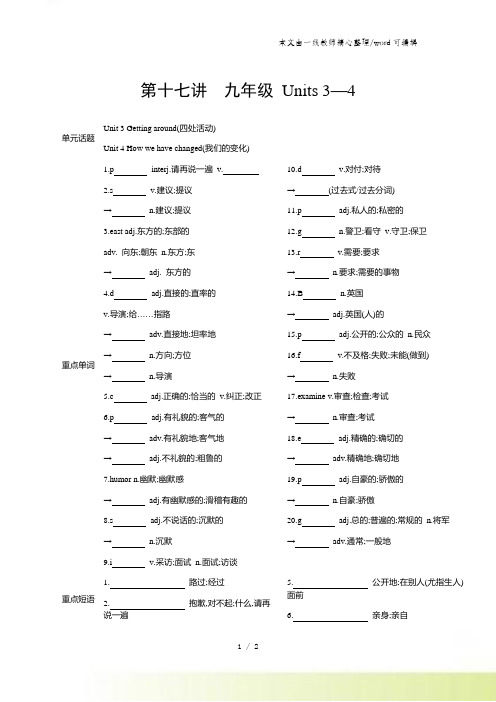
第十七讲九年级Units 3—4单元话题Unit 3 Getting around(四处活动)Unit 4 How we have changed(我们的变化)重点单词1.p interj.请再说一遍v.2.s v.建议;提议→n.建议;提议3.east adj.东方的;东部的adv. 向东;朝东n.东方;东→adj. 东方的4.d adj.直接的;直率的v.导演;给……指路→adv.直接地;坦率地→n.方向;方位→n.导演5.c adj.正确的;恰当的v.纠正;改正6.p adj.有礼貌的;客气的→adv.有礼貌地;客气地→adj.不礼貌的;粗鲁的7.humor n.幽默;幽默感→adj.有幽默感的;滑稽有趣的8.s adj.不说话的;沉默的→n.沉默9.i v.采访;面试n.面试;访谈10.d v.对付;对待→(过去式/过去分词)11.p adj.私人的;私密的12.g n.警卫;看守v.守卫;保卫13.r v.需要;要求→n.要求;需要的事物14.B n.英国→adj.英国(人)的15.p adj.公开的;公众的n.民众16.f v.不及格;失败;未能(做到)→n.失败17.examine v.审查;检查;考试→n.审查;考试18.e adj.精确的;确切的→adv.精确地;确切地19.p adj.自豪的;骄傲的→n.自豪;骄傲20.g adj.总的;普遍的;常规的n.将军→adv.通常;一般地重点短语1.路过;经过2.抱歉,对不起;什么,请再说一遍5.公开地;在别人(尤指生人)面前6.亲身;亲自参考答案:第十七讲 九年级 Units 3—4【重点单词】1.pardon; 原谅2.suggest; suggestion3.eastern4.direct; directly; direction; director5.correct6.polite; politely; impolite7.humorous8.silent; silence9.interview 10.deal; dealt 11.private 12.guard13.require; requirement 14.Britain; British 15.public 16.fail; failure 17.examination 18.exact; exactly 19.proud; pride 20.general; generally 【重点短语】1.pass by2.pardon me3.时常;有时4.deal with5.in public6.in person7.为……感到自豪8.proud3.from time to time4. 应对;处理7.take pride in8.be of 为……骄傲;感到自豪重点句型1.Could you please tell me how to get to the post office? 你能告诉我怎样去邮局吗?2.I wonder where we should go next.我想知道接下来我们应该去哪里。
中考英语复习 第一篇 语言基础知识 第16课 九年级 Units 3-4基础知识-人教版初中九年级全
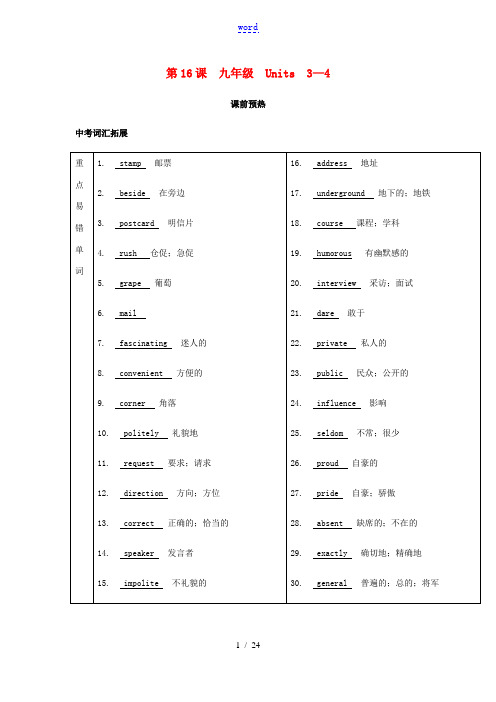
第16课九年级 Units 3—4课前预热中考词汇拓展中考词组短语中考句型回顾课堂突破中考重点单词与短语一、waste的用法【例句展示】1. When he was in the middle school, he wasted a lot of time. 他在中学时浪费了很多时间。
2. Don’t throw waste chemicals into rivers.不要把废弃的化学物品扔进河里。
3. We all think it’s a waste of time and money.我们都认为这事既浪费时间又浪费金钱。
4. My parents tell me not to waste time watching TV. 我的父母告诉我不要浪费时间看电视。
【精讲辨析】1. waste作动词,意为“浪费”。
2. waste作形容词,意为“废弃的;丢弃的;无用的”。
3. waste作名词,意为“废弃物;废料”。
4. waste... (in) doing sth.浪费……做某事。
【活学活用】用waste的适当形式填空。
1. Be careful not__________ paper.2. Don’t__________ your time in playing puter games.3. It’s a__________ of time.二、dare的用法【例句展示】1. We must dare to think, speak and act.我们必须敢想、敢说、敢做。
2. He doesn’t dare (to) say anything.他什么也不敢说。
3. We all know she was wrong, but none of us dared (to) tell her.我们都知道她错了,但我们没有一个人敢对她说。
【精讲辨析】dare为实义动词,意为“敢于;胆敢”。
dare to do sth. 意为“敢于做某事”,其中to有时可以省略(尤其是在否定句或疑问句中)。
九年Units3-4教学案-九年级英语复习课(无答案)
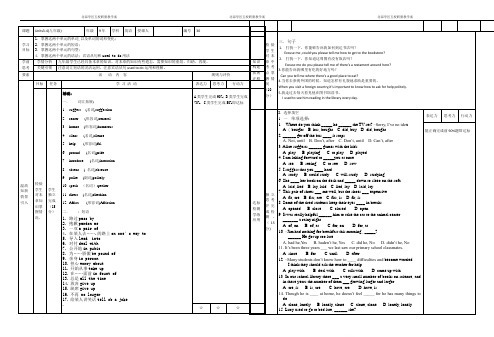
课题Units3-4(九年级) 年级9年学科英语授课人编号30学习目标1.掌握这两个单元的单词,以及单词的词形变化;2.掌握这两个单元的短语;3.掌握这两个单元的句型;4.掌握这两个单元的语法;宾语从句和used to do用法学前思考学情分析九年级学生已经具备本章的知识。
对本章的知识有些遗忘,需要知识的重组、归纳、再现。
关键引领注意词汇短语的灵活运用,注意宾语从句used to do运用和理解。
要素活动内容规则与评价温故知新情景引入目标任务学习活动表达力思考力行动力检验学生对本章知识掌握情况。
学生独立完成(15分)活动:一.词汇拓展;1.suggest----(名词)suggestion2.center-----(形容词)centeral3.humor----(形容词)humorous4.silent-----(名词)silence5.help------(形容词)ful6.pround-----(名词)pride7.introduce-----(名词)introution8.absent----( 名词)abseuce9.polite----(副词)politely10.speak---(名词)speaker11.direct----(名词)direthion-12.Africa------(形容词)Africaion二.:短语1.路过pass by2.抱歉pardon me3.一双a pair of4.在某人去…….的路上on one’s way to5.导入lead into6.对付deal with7.公开地in pubic8.为……骄傲be pound of9.亲身in person10.担心worry about11.开始从事take up12.在……面前in fount of13.总是all the time14.放弃give up15.缺席give up16.不再 no louger17.给某人讲笑话tell sb a joke. .A类学生完成90%;B类学生完成70%,C类学生完成50%即达标☆☆☆知识构建拓展迁移检验学生对本章中考考点掌握情况(10分)三.句子1.打扰一下,你能够告诉我如何到达书店吗?Excuse me ,could you please tell me how to get to the bookstore?2.打扰一下,你知道这周围有没有饭店吗?Excuse me do you please tell me of there’s a restament around here?3.你能告诉我哪里有吃的好地方吗?Can you tell me where there’s a good place to eat?4.当你去参观外国的时候,知道怎样有礼貌地求助是重要的。
九年级Units 3-4重难点详解

九年级 Unt - 4重难 点详解 i 3- s
UHale Waihona Puke t3 i 1 o ' tiks te .e rod h udb l w dt rv .我 认 为 不 应 该允 许 l .Id nt hn i eny a —lss o l eal e d ie x o o 6岁
s . t 替换 。e : h g
T e g e nt l . hy g e o g h l . hy r do e a = e r di di e a 他们对这个计划意见一致。 ae hpn T ae n nt pn 特别提 : rewt 可 以表 示 “ a e i g h也 某人适 应 ( 食物 、 气候 等)。 e: ” g T ew ahr os’arewt e 我不 适应 这种 天气 。 h ete en ge i m . d t h
()i ge 2dsr e是 a re的 反义词 , 当于 nt ge 。 a ge 相 o a e r 3 B t o t sI alw d t td t r n ’ h u e 但 有 的时 候 我 被 允许 在 朋 友 . u mei ' l e os ya fi dS o s . s me m o u a e 家学 习。 蕊
词 。e : g
Wea ge i i 我们 都 同意 他 的意 见 。 l r ewt hm. l a h D o ge i yies oy ua rew t m a?你 同意我 的观点 吗? h d a e r g et 示 “ o表 同意 ” 后 面 接 表示 “ 划 , , 计 建议 , 排 ” 的名 词 , 动 词 原 形 时构 成 动词 安 等 接 不定式 结构 。e : g Heare u lna ls 最 后他 同意 了我们 的计 划 。 ge dt o r a tat o p .
英语中考总复习 九年级(全) Units 3-4
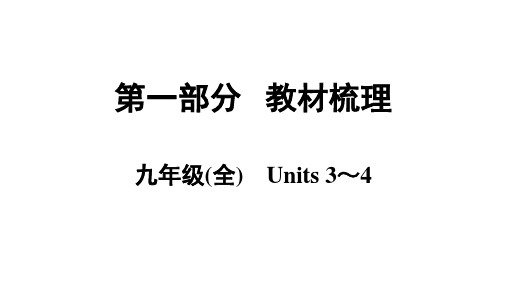
and has made many new friends.
A. being
B. to being
C. to be
D. be
7. This small room____D____ keep some things like old books and tools
all the time.
A. used to
repaired.这辆自行车需要修一修。
考点4 I know my parents love me and they're always proud of me.我 知道我的父母爱我并且以我为傲。
【考点抢测】辨析proud与pride 10. I am very proud __B__ you that my best friend has just won the
15. _h_u_m__o_r_o_u_s_ adj.有幽默感的;滑 ★__b_e_p_r_o_u_d__o_f_为……骄傲;感到
稽有趣的
自豪
20. _p_o_l_it_e_ly__ adv. 礼貌地;客气地 ★___in__p_u_b_l_ic___公开的;在别人(尤
21. _s_e_l_d_o_m__ adv.不常;很少 3次 22. _e_x_a_c_t_ly__ adv.确切地;精确地
A. solve
B. solved
C. solving
D. to solve
【满分点拨】
require意为“需要;需求”。常用于以下结构:
(1)require+n. 意为“需要某物”。如:They require our help. 他们需要
我们的帮助。
(2)require sb. to do sth.意为“要求/命令某人做某事”。如:All the
中考宁夏专用英语人教版教材复习九年级全册Units-3-4课件
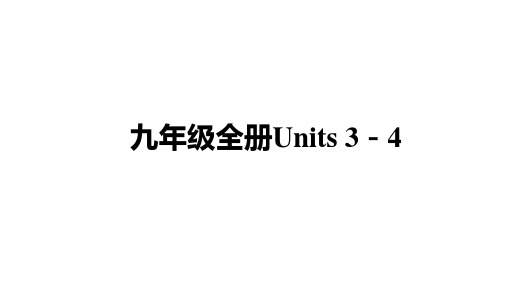
学以致用
1.It has been three months since he left his home.(改为同义句) ① _T_h_r_e_e_m__o_n_t_h_s __h_a_s__ p__a_ss_e_d_ _s_in__ce__ he left his home. ②He __h_a_s__ _b_e_e_n__ _a_w_a_y__ _f_ro_m___ his home for three months. 2.自从我们上次见面以来已经五年了。(汉译英) It has been five years/Five years has passed since we met last time/last met.
25.require v.需要;要求 27.speech n.讲话;发言 29.seldom adv.不常;很少 31.absent adj.缺席;不在
重点短语 1.pass by 路过;经过 2.pardon me 抱歉,对不起;什么,请再说一遍 3.ask for help 寻求帮助 4.depend on 取决于 5.lead into 导入;引入
重点句型 1.You ___n_e_v_e_r__ ___k_n__o_w__ ____u__n_ti_l_ you try something. 直到你尝试了,你才会了解一些事情。 2.Sometimes we even need to ___s_p_e_n_d__ time ____l_e_a_d_in_g______in_t_o_ a
2.stamp n.邮票;印章 4.postcard n.明信片 6.bathroom n.浴室;洗手间 8.suggest v.建议;提议 10.corner n.拐角;角落 12.direction n.方向;方位
中考英语复习九年级(全) Units 3—4
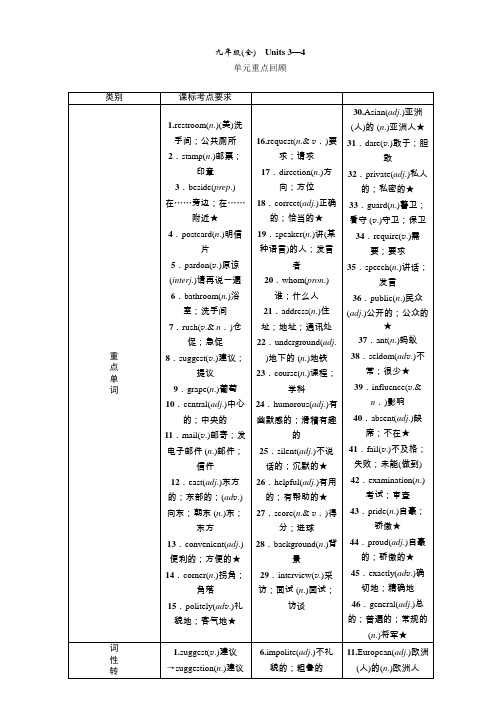
九年级(全)Units 3—4单元重点回顾try something.有些事情你只有尝试过才知道。
3.When you visit aforeign country,__it__is__important__ to__know__ how toask for help__politely__.当你去外国时,知道如何礼貌地寻求帮助很重要。
5.__It__is__all__rig ht__to__ ask yourclassmates direct questions because you know them well.向你的同班同学直接问问题是完全可以的,因为你很了解他们。
6.I __used__to__ beshort.I__didn't__use__to__ be popular in school.我过去很矮。
我过去在学校不受欢迎。
续表类别课标考点要求重点句子7.I used to __be__afraid__of__the dark.我以前害怕黑暗。
8.—You used to be short,__didn't__ you?你过去很矮,不是吗?—Yes,I did./No,I didn't.是的,我很矮。
/不,我不矮。
9.—__Did__ he __use__ towear glasses?他过去戴眼镜吗?—Yes,he did./No,he didn't.是的,他戴(眼镜)。
/不,他不戴(眼镜)。
10.__It__is__hard__to__believe__that__ he used to havedifficulties in school.很难相信他过去在学校有很多困难。
11.__It's__been__ three years__since__we__last__saw__our__primary__school__classmates__.自从我们上次见到小学同班同学以来,已经有三年了。
Units3-4单元测试 人教版九年级英语全册+

Units3-4单元测试一、完形填空When I was young ,I became very interested in singing. My father would 1._____ all my shows.In Grade 7,I was to 2._____ in the theater with my favorite singer. The night before the show, my father came to me and sadly 3._____ that he wouldn't be able to watch. He had to finish an important task and the theater was a three-hour 4._____fom his work place. He promised to 5._____ it on the radio.The next day as the performance time came near,I couldn't 6._____thinking about my dad. For some 7._____,before my performance,I ran out to have a look 8._____the parking lot. There I saw his car. He had finished the task and made the9._____ drive to see part of the show.Years later I had become a teacher. Early one morning I was awakened by the 10._____of the telephone. I'll never forget my mother telling me that my dad had just been dead in a car accident.As I listened I could hear my heart 11._____. For a long time after that, things really didn't matter to me.I went about my life, but I really didn't care 12._____. It felt 13._____my heart had been broke.One day,I 14._____ realized that my father had left me something behind even if he was gone ,such as his smile,15._____ and those warm days when he was with me. Like his father , there will be times in my son's life when he feels pain, which will be a power to bring him forward.1.A.win B. become C.direct D. watch2.A. serve B. volunteer C. perform D.cheat3.A.introduced B.explained C. thought D. reported4. A. running B. flying C.drive D. walk5. A. listen to B. look down C. stick to D. look forward to6.A. mind B. finish C. keep D.help7. A. reason B.situation C. plan D. advice8. A. from B. against C. behind D. at9.A. easy B.long C. exciting D.tidy 10.A. sense B.mess C. rock D.sound11.A.hit B.beat C.knock D.jump12. A. anything B.everything C.something D.nothing13.A.as soon as B.as well C. as long as D.as if14.A. suddenly B.actually C.especially D. gradually15. A. kindness ziness C.darkness D.shyness二、阅读理解A篇When I was very young, people in our village lived by planting fruit trees. My grandmother always took me to the orchard (果园) on the hill. At that time, they had to carry water from the river at the foot of the hill to halfway up the hill. Even though we worked so hard.the production level of fruit was still low because it was short of water there.One day , two young men led a group of workers to our village.They learned about the difficulties we faced,and later,canals and other projects began to be built in my village. “Who are they?” I asked.“They are good men from our government,” my grandma replied.Shortly afterwards,I moved to another city for my junior high school. The only reason I ever came back to my hometown was my grandmother.One day, my family and I returned to the village.We were surprised because everything had changed. The canal ran past every orchard so villagers didn't have to go up and down the hill anymore. The river was so clean that fish swam happily in it. When we arrived home, my grandma took out some fresh pears and apples. She told us that after the water conservation project(水利工程)was completed,a policy (政策) was made to encourage more people to increase the fruit production with clean water in the river. Thank those good men who have devoted themselves to the development of our countryside.Nowadays, people work hard to live in a big city. However, we should not forget our hometowns where we are from.16.The good men came and offered help probably because of_____.A. the villagers’ suggestionsB. the government's supportC. a school's practical activityD.a company's engineering plan17. The underlined phrase “devoted themselves to” is closest in meaning to _____.A.prepare much forB. donated money toC. drawn public attention toD. put much effort into18.What can be the best title for the passage?A.How is a village improved?B. Who are the good men?C.Why do people come back?D. What does a hometown mean?B篇As a student, I was most afraid to answer questions in class, and I found that the students around were just like me. At the beginning of each class, when the teacher asked a question, I always lowered my head because I was afraid that the teacher saw me. One day, in a foreign language class, Mr. Black gave us a lesson. He wanted us to be active in class, so he asked us some questions.but no one answered. “Let me tell you a story first,”he said. “When I came to the United States to study, the university often invited some famous people to make speeches. Before the beginning of every speech, I found an interesting thing. The students around me always took a piece of cardboard folded in half, wrote their names boldly with the most eye-catching color, and then placed the cardboard on the seat. So when the speaker needed the answers from the students, he could see and call listener's name directly.“I couldn't understand that. My classmate told me the speakers were all top people who stood for chances. When your answer was to his surprise, it meant he might give you more chances. In fact,I really saw a few students got great chances because of that.”After listening to the story , I understood that the chance would not find you itself. You must show yourself all the time so that you could find a chance on the cards.19.What did Mr. Black want the students to do in his class?A. Read loudly.B. Take notes carefully.C.Be active.D.Listen to him quietly.20.How did the writer's classmates behave when they were asked questions?A. They raised their hands.B.They shook their heads.C. They closed their eyes.D.They lowered their heads.21.How did the speaker get to know the students’ names?A. He got them from the computer.B.He saw the cardboard on the seats.C.He asked the students for their names.D.He got them from the name list on the teacher's desk.22. What does the writer mainly tell us?A. Doing as others do is necessary.B.Answering questions bravely is easy.C.Attracting others’ attention is interesting.D.Showing yourself bravely can win chances.三、补全对话A篇Peter: Excuse me , sir? Could you tell me the way to the nearest bank?Li Hua:23._____You can ask the lady over there.Peter: Thank you all the same.(A moment later.)Peter: Excuse me.24._____Wang Mei: No,there isn't a bank near here, but there is one near the People's Hospital.Peter:25._____Wang Mei: It's about fifteen minutes' bus ride.Peter: 26._____Wang Mei: The No.10 bus.Peter: 27._____Wang Mei: It is across from the bookstore.Peter: Thank you very much.Wang Mei: You're welcome.A.Is there a bank near here?B. How far is it from here?C.Where is the nearest bank?D.Which bus can I take?E. Sorry, I’m new here.F. By the way, where is the bus stop?G. That sounds great.B篇A: Wow! Jim, you have changed so much that I can hardly recognize you!Didn’t you use to be short?B: 28.____________________.But I am the tallest boy in my class now.A: What happened to your hair? You used to have long hair.B: Well, I often play basketball now. And I need to have short hair.A: 29.________________________________________?B: I play basketball every day. 30.__________________________________? A: No. I seldom play basketball now.B: 31._____________________________? You used to be good at it.A: Because I have to spend most time on my study. But maybe we can play it together this summer vacation.B:32._____________________________.四、用所给词的适当形式填空33.I n the sports meeting, she came __________in the 200 meters.(three)34.T he shopping mall lies in the __________part of the city.(center)35.S cientists suggest __________the ice water and other things on the moon to print 3D building materials.(use)36.C ompared with modern __________, writing letters has some advantages that can’t be missed.(communicate)37.W e are going to take a __________flight to Chengdu when the exam over.(direct)38.M r Chen was surprised to see the fast development in China after his long __________from the country.(absent)39.D runk driving is one of the most common __________of traffic accidents. (cause)40.J ack looked through the __________about the book before he decided to buy it.(introduce)41.L ast week a reporter __________my grandma. He asked about her healthy life.(interview)42.T he dinosaurs were on the Earth for over 160 million years. Then they suddenly __________.(appear)五、语法填空:Dear Mrs Smith,I was a student of yours in Grade Six , and I hope you still 43.__________ (remember) me.I’m writing this letter because I want to let you know that the school year with you was important and special to me. I take 44.__________ (proud) in it all the time.I know I 45.__________(use) to be very quiet in your class. But you did something that changed 46.__________(I) life a lot. You know, I hated to read in the past. Books were just words that had very little to do with me, and I was 47.__________(boring) with them. I'll never forget the first day of Grade Six when you took out a thick book and 48.__________(begin) to read the story to our class. Your voice 49.__________(seem) to change with the people in the story, and you drew pictures in my mind as you read aloud. From then on , I made a 50.__________(decide) to do the reading well. I will never 51.__________(give) up reading in my life.When I picked up a book and read it myself, I found that I could make the words interesting, too.Now I love reading! Thank you for 52.__________ (open) the world of books for me.Yours .Nancy。
- 1、下载文档前请自行甄别文档内容的完整性,平台不提供额外的编辑、内容补充、找答案等附加服务。
- 2、"仅部分预览"的文档,不可在线预览部分如存在完整性等问题,可反馈申请退款(可完整预览的文档不适用该条件!)。
- 3、如文档侵犯您的权益,请联系客服反馈,我们会尽快为您处理(人工客服工作时间:9:00-18:30)。
3. ——在我家我们有很多规定。 —We have a lot of rules at my house.
——我们家也是(有很多规定)。 So do __. —___ __ we 4. 那将会是一个既让老师高兴又让学生满意的办法。
keep That would be a good way to ____ both teachers and students happy ______.
可接双宾语(refuse sb. sth. )
(2)accept/ receive /refuse 的辨析
答案:①A
②C
2. get along with与„„相处
◆Your friends would probably say that you are easy to get along with. 你的朋友们也许会说你是个容易(与之)相处的人。 ①I find it difficult to get _______ with the boss. A. along B. up C. out D. down
② You can read the English book. I can read it, too. (改为同义 句) You can read the English book. So _______ _______.
【自主归纳】so+助动词+主语/so+主语+助动词的用法辨析 句式 用法 区别关键 不同 前后两句为 _____ (相同/不同)主语 相同 前后两句为 _____ (相同/不同)主语
C. come across
D. come on
【自主归纳】come out的用法
(1)come out 可意为“出版;出现;(花)开”。
(2)come out 不能用于被动语态。
(3)come 的搭配归纳
答案:①B
②comes/came out
③B
4. —We have a lot of rules at my house. 在我家我们有很多规定。 —So do we. 我家也是(有很多规定)。
8. stay up 9. at present 10. in the way 11. get along/on with. . . 12. come up with
熬夜 _____ 目前;现在 __________ 挡道的;妨碍人的 _________________
与„„相处 ___________
(1)get along with =get ___ with 与„„相处; 进展 on (2)get along/on well with. . . 与„„相处融洽 how (3)对get along/on well with的well提问时,用____。 答案:①A ② How do ; your
medical 4. medicine(n. )→ _______(adj. )医学的;医疗的 worried 5. worry(n. )→ _______(adj. )担心的 energetic 6. energy(n. )→ ________(adj. )有活力的 confidence 7. confident(adj. )→ __________(n. )自信心
C. not allow to
【解析】选B。考查情态动词的被动语态。句意:我认为不应
该允许青少年开车,他们不够认真。故选B。
2. (2012· 四川中考)—I like drinking wine. But people who drink wine aren’t allowed to drive. —If I _______ you. I would give up _______ wine.
意为“„„也是如此”, so+助动词 表示前面陈述的情况也适 +主语 于后者 so+ 主 语 + 意为“„„确实如此”, 助动词 表示赞同前面说过的情况 答案:①A ②can I
5. You would also rather stay at home and read a good book
than go to a party.
A. were; drinking
C. were; drink
B. am; drinking
D. was; to drink
【解析】选A。虚拟语气中be动词用were形式,give up doing
答案:①would rather work
②A
Ⅰ. 单项选择 1. (2012· 自贡中考)I think teenagers should _______ drive. They are not serious enough.
A. be allowed to
B. not be allowed to
②The students in our class get on very well with each other. (对
画线部分提问)
_______ _______ the students in _______ class get on with each
other?
【自主归纳】get along with 的用法
九年级 Units 3、4
点击进入相应模块
sleepy 1. sleep(v. )→ ______(adj. )困倦的 asleep → ______(adj. )睡着的 importance 2. important(adj. )→ __________(n. )重要性 success 3. succeed(v. )→ _______(n. )成功 successful → _________(adj. )成功的 → successfully __________(adv. )成功地
你也宁愿待在家里看一本好书而不愿去参加聚会。 ①他宁愿在乡村工作。 He _______ _______ _______ in the countryside. ②It’s cold today. I would rather _______ at home than _______ a walk in the park. A. stay; take C. stay; to take B. to stay ; to take D. to stay ; taking
3. come out 出版;发表 ◆His new book,What Would You Do If. . . ? came out last
month.
他的新书,《如果„„, 你会怎么办?》上个月出版了。
①When _______ the books about the teenagers _______ out?
1. 代替
2. 全神贯注;专注于 3. 担心;关心 4. 一点儿也不;根本不 5. 很多的;足够的 6. 使„„失望或沮丧 7. 出版;发表
instead _______ of concentrate __________ on about /for care _________ not. . . in the slightest _______ plenty ______ of down let. . . _____ come ___ out
【自主归纳】
(1)would rather意为“宁愿”,后接动词原形, 表示优先选择的
一种方式,其否定形式: would rather not do sth. 。 (2)would rather do sth. . . . than (do). . . 相当于would do sth. . . . rather than (do). . . 意为“宁可„„也不愿„„”,“与其„„ 倒不如„„”。 (3)使用would rather . . . than . . . 句型时,要注意“平行结构”, 即在than 的前后要用两个结构相同的词或词组。
【品词自测】根据句意用所给词的适当形式填空 ①Linda was so _______ that she fell _______ in a minute. (sleep) ②Every _______ person always plans for his _______. (success) ③The woman looked _______, maybe she is _______ about her little baby. (worry) 答案:①sleepy; asleep ③worried; worrying/worried ②successful; success
8. listen(v. )→ _______(n. )听者 listener
knowledge 9. know(v. )→ __________(n. )知识 knowledgeable → _____________(adj. )知识渊博的 helpful 10. help(v. )→ _______(adj. )有帮助的
提出;想出(主意、回答等) ________________________
1. 不应该允许16岁的青少年穿耳洞。 pierced get Sixteen-year-olds shouldn’t be allowed to ___ their ears _______. 2. ——我认为不应该允许16岁的青少年开车。
②He _______ my invitation but _______ it. A. received; accepted B. accepted; received
C. received; refused
D. refused; received
【自主归纳】
(1)refuse的用法 可接不定式作宾语 refuse
5. 如果你有一百万美元你会怎么做呢? would What ______ you do if you had a million dollars? ___ 6. 要是其他人都带礼物了(我该)怎么办? _____ __ everyone else brings a present? What if 7. 你也宁愿待在家里看一本好书而不愿去参加聚会。 rather stay would read You ______ also ______ ____ at home and ____ a good book than go ____ __ to a party.
